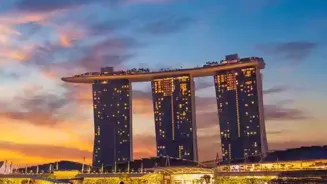New Delhi, Sep 4 (PTI) India and Singapore on Thursday unveiled a roadmap to expand their comprehensive strategic partnership including by deepening trade and ensuring better market access with Prime Minister
Narendra Modi and his Singaporean counterpart Lawrence Wong signalling a firm resolve to jointly navigate the global trade disruptions caused by Washington's tariff tussle.
In their talks, Modi and Wong agreed to work closely to boost bilateral ties in areas of advanced manufacturing, semiconductor, artificial intelligence, green shipping, skilling, civil nuclear energy, aviation and defence and security including possible cooperation in developing unmanned vessels.
The two sides signed five agreements that will provide for cooperation in areas of aviation, skill development, green and digital shipping, space and digital asset innovation including to develop next generation financial infrastructure.
Wong, accompanied by a high-level delegation, arrived in Delhi on Tuesday on a three-day visit, his first to India as the prime minister.
India's ties with Singapore are considered significant as the city-state is the largest foreign investor in India, accounting for around a quarter of the country's foreign direct investment inflows.
A Memorandum of Understanding (MoU) on green shipping will facilitate collaboration on establishment of a Green and Digital Shipping Corridor (GDSC).
The two prime ministers also virtually inaugurated a container terminal at Nhava Sheva port in Mumbai. The Port of Singapore Authority (PSA International has invested over USD one billion in the project.
For next phase of ties, the two sides identified eight pillars for cooperation which are : economic cooperation, skills development, digitalisation, sustainability, connectivity, healthcare and medicine, people-to-people and cultural exchanges, and defence and security cooperation.
"Today, we have charted a detailed roadmap for the future of our partnership. Our cooperation will not remain confined to traditional areas," Modi said in his statement to the media after talks with Wong.
"In keeping with the needs of changing times, advanced manufacturing, green shipping, skilling, civil nuclear energy, and urban water management will also emerge as focus points of our collaboration," he said.
"We have resolved that, in order to further accelerate our bilateral trade, a time-bound review will be undertaken of our comprehensive economic cooperation agreement, as well as our free trade agreement with ASEAN (Association of Southeast Asian Nations)," Modi said.
In his remarks, Wong said both the countries can strengthen resilience, seize new opportunities and contribute to stability and growth in the region and beyond.
"In a world marked by great uncertainty and turbulence, the partnership between India and Singapore becomes even more important because this is a partnership rooted in shared values, mutual respect and a deep reservoir of trust," he said in his media statement.
"I look forward to working hand-in-hand with Prime Minister Modi to bring the Singapore-India partnership to even greater heights in the years ahead," he said.
In the talks, the two sides agreed to jointly develop sustainable industrial parks and next-generation industrial parks with advanced manufacturing capabilities, including through facilitating ventures and partnerships.
India and Singapore also agreed to deepen defence technology cooperation in emerging areas such as quantum computing, AI, automation and unmanned vessels, a joint statement noted.
It said Singapore acknowledges with appreciation India's interest in the Malacca Straits Patrol.
At a media briefing, Secretary (East) in the external affairs ministry P Kumaran said there was no discussion on Trump administration's policy on tariff, adding the broad global uncertainty and way to deal with it figured in the talks.
In his remarks, Modi said both sides have agreed to expand collaboration in artificial intelligence, quantum, and other digital technologies.
The prime minister described Singapore as a vital pillar of India's Act East Policy, adding "we will continue to advance cooperation with ASEAN and carry forward our joint vision for peace and stability in the Indo-Pacific region." "Our relations go far beyond diplomacy. This is a partnership with purpose, rooted in shared values, guided by mutual interests, and driven by a common vision for peace, progress and prosperity," he said.
Modi further said the two sides shared common concerns regarding terrorism.
"We firmly believe that it is the duty of all nations that value humanity to unite in the fight against this menace."
"In the aftermath of the terrorist attack in Pahalgam, I express my deep gratitude to Prime Minister Wong and the Government of Singapore for their condolences to the people of India and for their steadfast support in our fight against terrorism," he said.
In the briefing, Kumaran said there was a suggestion that India could consider joining the ASEAN electricity grid.
It is learnt that the two sides also explored the possibility of civil nuclear cooperation in the domain of small modular reactors (SMRs) "Yes, there is broad agreement that this is a potential area of cooperation, including new and emerging technologies, such as SMRs. It's still very early, there was only a preliminary discussion," Kumaran said.
"It was agreed that teams will be formed on both sides to try and take this discussion forward. So we look forward to more details as and when the two teams engage," he said. PTI MPB ZMN





















